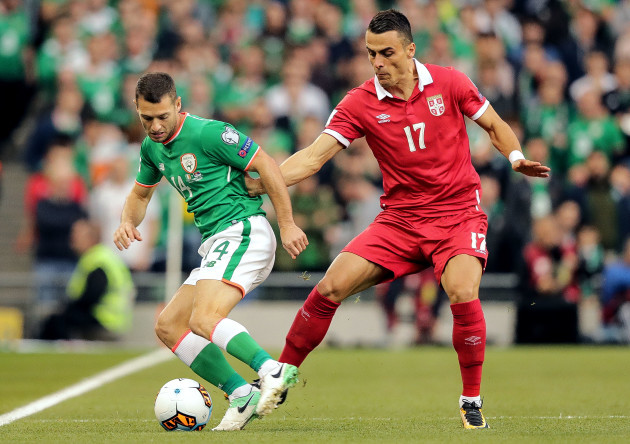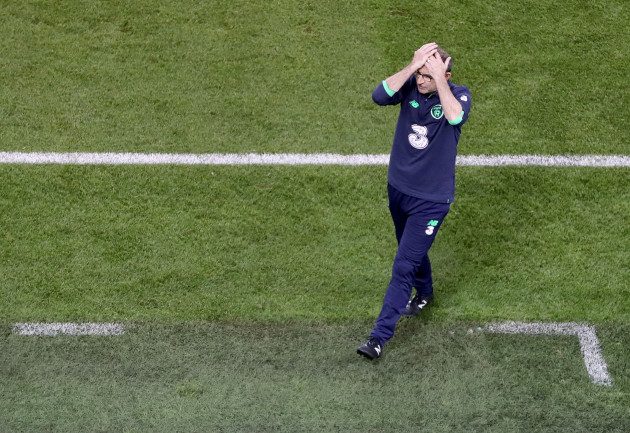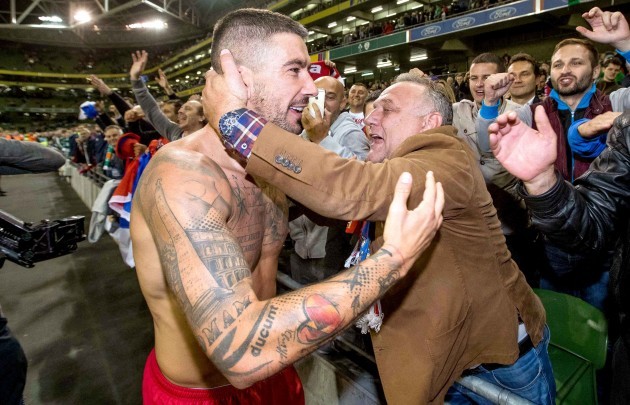1. Ireland show remarkable heart but little quality in the final third
In the end, it was one of those dreaded moral victories that Ireland assistant boss Roy Keane famously spoke so dismissively about in his first autobiography.
The Boys in Green delivered a much-improved display after Saturday’s dire performance in Georgia and showed themselves to be capable of competing technically with Serbia at times to the surprise of some critics, yet those positives could not prevent an ultimately disastrous outcome for the hosts.
It was, in many ways, a typical Irish performance, full of endeavour and endless long balls into the box.
However, with Serbia on the ropes, the Boys in Green could not land the knockout blow.
If was not for the want of trying, of course. As is almost always the case with Irish sides, the intensity and worth ethic was faultless. James McClean epitomised their tenacity — virtually everything the West Brom winger did seemed to be at 100 miles an hour, while the rest of team followed his lead with similarly committed displays.
The 68th-minute dismissal of Nikola Maksimovic for a foul on Daryl Murphy increased hopes of an Irish comeback, but for the second time in this campaign, Martin O’Neill’s men could not score against a team who finished with 10 players (as was the case in the Wales home match also).
But even in the first half, when Ireland — inspired by the re-introduction of the technically gifted Wes Hoolahan — performed with some panache, it always seemed as if breaking Serbia down would prove an arduous task.
Each time a half chance arose, the hosts simply were not clinical and composed enough in the final third to capitalise.
When Robbie Brady played through Hoolahan, the Norwich man’s heavy touch allowed the defender to recover, when Cyrus Christie broke promisingly down the right, he simply could not deliver the type of cross needed to trouble Serbia.
Following Maksimovic’s dismissal, the embattled visitors were pinned back into their own box, enabling Ireland to dominate possession and territory amid a frenetic final flurry.
However, with arguably their two most technically accomplished players, Wes Hoolahan and Aiden McGeady, substituted and injured respectively, there was not much guile to the Irish play, and they instead resorted to hammering balls in hopefully to the physically imposing three-man strike force of Jon Walters, Shane Long and Daryl Murphy.
There was a desperation and lack of composure about Ireland’s attack in these dying minutes especially, resulting from the pressurised nature of the situation.
The long ball was launched in relentlessly towards the end of the match, even when players were free in acres of space out wide and a pass was on.
Moreover, on the rare chances that the ball did fall to Irish players close to goal, there was a similar lack of poise and a palpable anxiety in their actions — significantly, of the home side’s 17 shots, only three hit the target.
Martin O’Neill admitted his men were not good enough in attack afterwards, ruefully noting: “I know we were going for it, but you have to play with your head.
“James (McClean) had a right-foot shot from the edge of the box. Conor Hourihane, who’s essentially left footed, had a left-foot shot but also had a right-foot shot. You have to keep that ball alive. Shane Long’s played a ball with seven or eight minutes to go thinking there was someone there (when there wasn’t).”
Often in football, what separates good teams from great ones is decision-making in the final third, and Ireland have consistently fallen short in this regard, not just this evening but over the course of the entire campaign.
One stat, as per the BBC, is telling. Ireland have scored just two goals at home over the course of this campaign – only Faroe Islands (1), Latvia, San Marino and Liechtenstein (all zero) have scored fewer.
Among other issues, Robbie Keane’s absence, it seems, is already being deeply felt.
2. Meyler and Hoolahan make a difference
Despite the disappointing result, manager Martin O’Neill can at least reflect on a decent performance on Tuesday against probably the best side in the group.
According to the official Uefa website, Ireland had 52% of the ball, completing 225 of their 288 passes.
It was a vast improvement on Saturday away to Georgia, when they had just 31% possession and completed 152 out of 192 passes.
On the one hand, they were playing at home against a Serbia side that did not need the win as badly as their opponents, so it was inevitable to a degree that the Irish team would see more of the ball.
However, there is no doubting there was an impressive flow to Ireland’s play that arguably was last evident as far back as Vienna in November of last year, when a 1-0 win over Austria put O’Neill’s men in pole position for qualification from Group D.
The common denominator was the inclusion of both Wes Hoolahan and David Meyler in midfield for the two games in question.
Both players have been used sporadically throughout the campaign, but they undoubtedly showed their worth at the Aviva on Tuesday.
Man-of-the-match Meyler broke up the play brilliantly and also displayed some ability on the ball at times, while he also demonstrated the kind of energy that Glenn Whelan, who is five years older than his midfield colleague, is physically incapable of emulating.
Hoolahan, meanwhile, brought a different dimension to Ireland’s play. Not only is he as good a player as the team has technically, the Dubliner also seems to bring out the best in others, creating space with his intelligent runs and constantly making himself available to receive the ball.
Both were missed after being substituted as Ireland tried in desperation to find a late equaliser, while the Championship-based pair will have strong claims to start Ireland’s final two qualifiers, given their obvious influence at the Aviva last night.
3. Ireland’s World Cup hopes hanging by a thread
At this point, it would take a minor miracle for Ireland to qualify for the World Cup.
Even if the Boys in Green win their final two games, there is no guarantee they will make the play-offs, with the current second-place team in Group D Wales, bottom of the runners-up table.
So Ireland are reliant on three things happening if they are qualify for next year’s World Cup — the team maintaining a 100% record in their final two games, results in other groups going in their favour and victory in a two-legged play-off if they get that far.
He may have already overseen shock victories over Germany and Italy, but as things stand, getting Ireland to Russia would be Martin O’Neill’s most improbable feat yet.
4. Four-year unbeaten record at the Aviva comes to an end
The Aviva Stadium has become a genuine fortress under Martin O’Neill — sides of the calibre of Germany, Poland and Bosnia have all come to the stadium and failed to take three points home with them.
Before last night, the Irish side had not lost competitively in four years on their own turf — Sweden in September 2013 were the last side to emerge from Dublin with a victory.
Since Martin O’Neill took over, they had gone nine qualifying games unbeaten at home until last night.
Serbia, however, in breaking this record kept another less positive stat from an Irish perspective alive — in five matches between the teams in total, the Boys in Green remain without a win.
Subscribe to The42 podcasts here:




